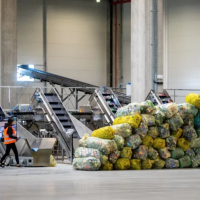Industry wants biodegradable bags’ credentials reviewed
Ez is érdekelhet

Industry has called for a thorough assessment of the environmental impact of oxo-biodegradable plastic bags, as EU lawmakers disagree over whether a ban is necessary.
Companies said an independent review is needed of the bags – conventional plastic bags enhanced with additives that catalyse degradation at the end of useful life.
The European Parliament wants to ban them but the Council of member states is opposed to a ban. Lawmakers are preparing for final negotiations on Monday on an update to the packaging waste directive.
“We believe that the European Parliament’s amendments against oxo-biodegradable plastic have been orchestrated by lobbyists for the vegetable-based plastics industry,” the Oxo-biodegradable Plastics Association (OPA) said in a statement emailed to ENDS.
It also said the Italian Presidency of the Council was trying to persuade member states to accept a deal that would outline the potential negative impacts of such bags, which would have a “damaging” impact on the industry.
Italy adopted in 2011 a ban on non-biodegradable plastic bags, which attracted infringement proceedings from the European Commission on the grounds of restricting the free movement of goods.
The Commission will reconsider its position once the new EU legislation is adopted as it gives member states the right to adopt such marketing restrictions, an official told ENDS.
At the time of the initial infringement procedure, the UK filed a complaint stating that the Italian standard of biodegradability favoured Italy’s own producers. These produce plant-based bags, as opposed to the fossil fuel derived oxo-biodegradables.
The Italian Presidency was not available to comment at the time of publishing.
Scientists at Blaise Pascal Univerisity in France also argue that proposals to ban oxo-biodegradable bags are based on “misinformation” and will hinder the development of the industry in Europe.
But a study for Plastics Europe has found that once oxo-biodegradable bags fragment into microplastics in the environment, the biodegradability of these fragments is “at least questionable and irreproducible”.
“Everyone, including plastic recyclers and composters, is very worried – except perhaps the ‘oxo-biodegradable’ industry – which is why the Parliament on two occasions voted with strong majorities to ban it,” said Parliament’s lead MEP Margrete Auken.
Source: ENDS Europe







